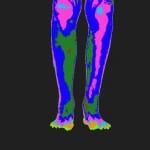It is not uncommon for new Greenville, Spartanburg and Anderson area patients to visit us with abdominal, flank, chest, or groin pain that remains undiagnosed. It is particularly frustrating when their previous doctors failed reveal a source. To the afflicted, self-doubt and then depression may set in.
For many, examination of the somatic system (muscles, nerves and ligaments) can hold the answer. Most of us understand that one sign of a heart attack is referral of pain into the chest wall and left arm. There is not as much awareness that musculoskeletal problems including Neck Pain, Thoracic Outlet Syndrome, and Myofascial Syndrome can cause similar complaints, including an initial impression that the heart is the source, when in fact it is not. Similar examples exist for abdominal, pelvic, flank, and groin pain.







